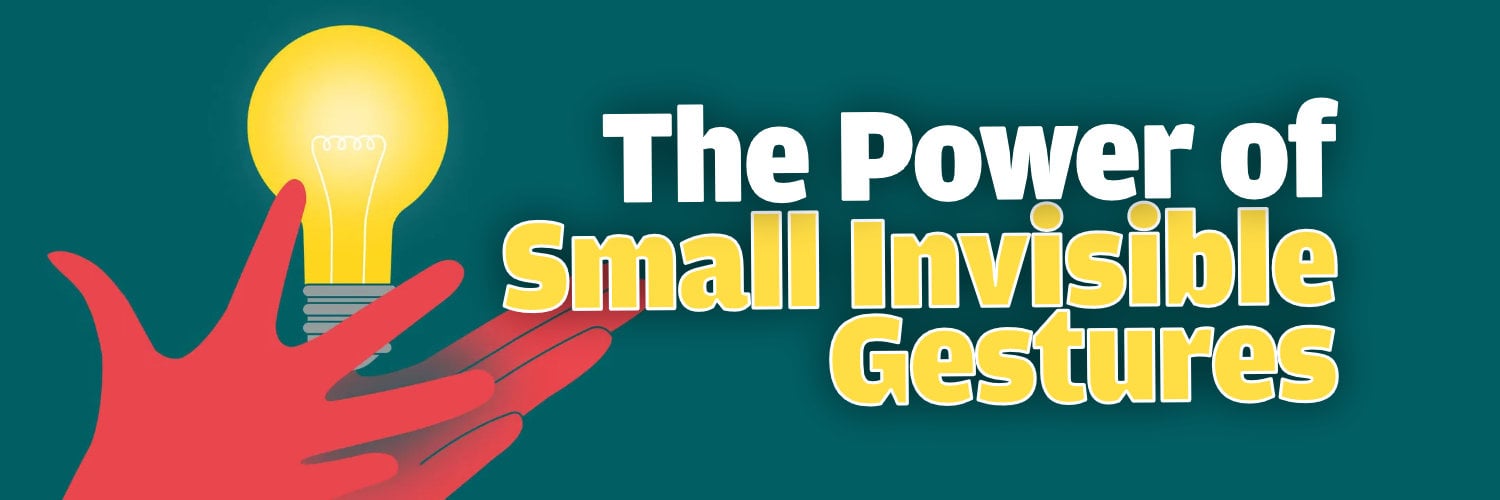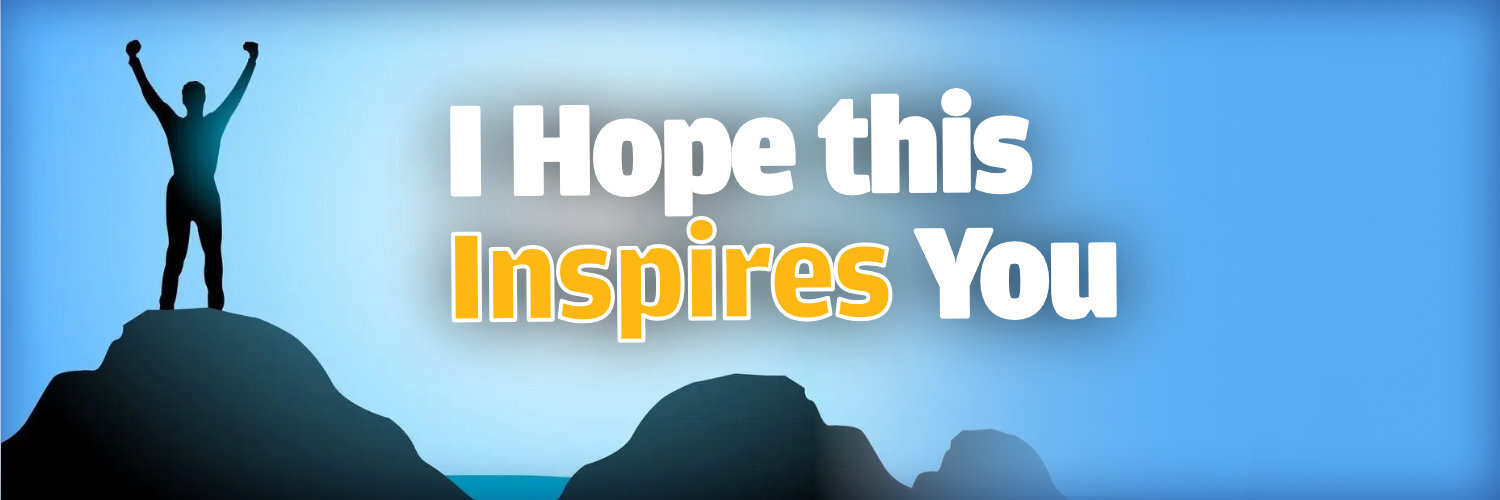
The Power of Small Invisible Gestures
It's the small things you do for others that seem insignificant to most people but not to the people that matter.
Becoming a full-time private investor is the pinnacle of financial achievement. Why? You don’t need the help of others for anything. You don’t need a boss. You don’t need clients. You don’t need customers. You don’t need their money. You have your own.

In 1997, on my 16th birthday, my parents sat me down and gave me a choice.
They told me they had saved approximately $20,000 for my college education. They had also co-signed paperwork so that I could open an account with their financial advisor. I could choose what to do with the money.
I had always been interested in money and the stock market. Technology stocks were starting to make daily headlines in the business section of newspapers. I called the financial advisor and he sent me a few analyst reports to review. I bought $5,000 worth of one technology stock. It doubled in two months.
I was hooked.
I filled out applications to a few private and public colleges. I realised I could spend all my money on one semester at a private college or attend a less expensive public university, live at home and commute, work part time, and continue to invest. I chose the latter path. I was in love with investing.
By 2000, I was a sophomore in college and working part time for a financial advisor. We had over 1,000 clients, so we were a sizeable office. My job was that of a glorified secretary who worked on marketing materials and answered the phone. The money I made working was enough to pay for my college tuition. The $20,000 from my parents I turned into $120,000 riding the technology bubble.
I didn’t realize I wasn’t skilled – I was lucky. A monkey could have picked winning stocks in that environment.
I enjoyed working for the financial advisor. It kept me close to the markets. The financial advisor liked having me there as well. By my second year on the job I was having discussions with him about becoming a financial advisor upon graduation. He even agreed to give me some of his clients to get started.
When the technology bubble burst, so did my portfolio.
By 2001, my portfolio of small–midcap technology companies fell so much they turned into microcaps. My $120,000 was now $8,000. I was financially and emotionally bruised.
Adding insult to injury, my day job consisted of answering calls from emotional clients and calming them down before sending them to my boss. I didn’t realize that, in addition to my undergraduate degree in economics, my day job would give me a master’s degree in psychology.
It’s often how we navigate the valleys in our lives that dictates our future direction. From this point forward I would solely focus on microcap stocks. I also realized I didn’t want to be a financial advisor. It is hard enough navigating your own emotions when investing, let alone the emotions of others. My goal from that point forward was to become a full-time private investor.
I achieved this goal seven years later in 2008. I first read Free Capital in 2014 and immediately connected with it. I could see pieces of my own story scattered throughout the book. It was the first book written for me. I loved how each investor’s journey and strategies were unique. At its core Free Capital is a book about financial independence and doing it your own way.
The first step to becoming financially independent is realizing money is about freedom not consumption – and this freedom can be achieved by anyone. I think a lot of people make the mistake of thinking they need enough money to do nothing. This is incorrect. You just need enough to do whatever you want. The power is having a choice.
You achieve financial independence by saving more than you spend, and investing those savings into an area where you have an advantage. For me it was microcap stocks, the smallest public companies in the world. For you it might be another area of the public markets or maybe even real estate, or some other area of expertise. Through skill and prudence, you get to a point where you finally have a choice. The choice might be to work less to spend more time with family, or go back to school, or start your own business, or perhaps even take a job that pays you less but gives you purpose when you wake up in the morning.
The financial media loves to glorify asset gatherers and managers – those who have built extreme wealth collecting fees by managing the capital of others. There is nothing wrong with this. In fact, today I manage a few outside accounts in addition to my own capital. But I believe the true financial test is turning a small amount of money into a larger amount of money and then supporting yourself on that capital over the long term. This is what the investors in Free Capital managed to do. Their stories remain inspirational.
To be successful as a full-time private investor your strategy and lifestyle need to be in harmony. When you support your family by managing your own capital it’s a different mental game. If you take a big loss managing other people’s money it hurts your bonus. If you take a big loss when you’re a private investor you hurt your family.
Becoming a full-time private investor is the pinnacle of financial achievement. Why? You don’t need the help of others for anything. You don’t need a boss. You don’t need clients. You don’t need customers. You don’t need their money. You have your own.
In early 2009, a few months after I became a full-time private investor, a friend invited me to a cocktail party in New York City. This was during the depths of the financial crisis. I was able to book a room at the Waldorf Astoria Hotel for $200 per night. A year earlier it was $800 per night. No one was spending money during this time, not even the rich.
I was one of 20 guests at the party. The guestlist was comprised of fund managers, analysts, and other financial professionals. I think they were the last 20 people who still had jobs on Wall Street. What I remember from that night was getting into an argument with a fund manager. I told him I was a full-time private investor. He gave me this look like I was beneath him. He said, “So I guess you weren’t good enough to keep your job.” I fired back, “You know what you call a fund manager? Someone who can’t support themselves on their own capital.” I left the party and enjoyed a $20 vodka tonic at the Waldorf. (Drink prices hadn’t changed from a year earlier.) Most of the people at that party would lose their jobs.
Here is a fact that few in the financial world want you to know. Individual investors have an edge over investment managers, advisors, analysts, or anyone forced to prove how smart they are to others. You don’t need to have an opinion on everything. You don’t have distractions. All you have to do is focus on making a few good investment decisions per year and living a great life.
One of my mentors is a successful private investor. I won’t call him a full-time private investor because he still has a day job. He works his day job not because he has to but because he likes it. His non-financial job offers him lots of autonomy, so he can focus on his investing when he needs to. His job also shields him from questions from family and friends if he were to quit his job and ‘retire’. What most don’t know about him is he has grown his portfolio from $100,000 to over $50 million over 20 years. You would never know it. He still lives in the same house, still has the same friends, still has the same life. One of his biggest worries is people finding out what he’s done and looking at him differently.
You don’t hear much about full-time private investors because publicity doesn’t benefit them. In fact, publicity hurts them. Full-time private investors like the fact that even family and friends don’t quite know what they do for a living. They like the fact that they’ve built up an extensive knowledge level in a niche of the market where it doesn’t benefit them to arm-wave their successes. The advantage of the private investor is you can go places bigger money can’t, and build up investment knowledge in an area where few others bother. You can live a comfortable life fishing the same small pond because you know where the fish are. The ability to fit into society, live below your means, and do so under the radar is a big advantage.
When I started dating my wife it took her a solid six months to understand what I did for a living. She just saw me working from home, on the phone, and occasionally making trips to “visit companies”. It didn’t help that I bought a new Porsche 911 the same week we started dating. I was coming off a big win and going through an immature materialistic phase. I’m pretty sure she thought I was a drug dealer. To this day, explaining what I do for a living is excruciating. It’s easier to tell them I’m unemployed; then they look at my wife in sympathy.
Several full-time private investors from Free Capital – including Vince, Peter, Eric, Vernon, Taylor, Sushil, and John Lee – focus on UK smallcaps and microcaps. Did you know that Warren Buffett, Peter Lynch, and many other great investors started in microcap and smallcap stocks as well? I also exclusively invest in the microcap arena. The reason why I and others focus on this area is because it’s one of the only places in the public markets where a small, astute investor has a clear structural advantage. It is impossible for larger institutions to invest in these small companies until these stocks rise and become more liquid. Great investors don’t follow the institutions; they invest where they are going to go.
A few of the investors in Free Capital had to change how they invested as their capital grew. Managing $10,000 is different than managing $1m, is different than managing $10m, is different than managing $50m. Sushil, for instance, only held ten UK small caps when he was younger. As his capital grew, he had to expand the amount of companies to 60 companies. Similarly, I used to invest in six companies, and now I’m in 12–15 companies. If you were to tell me ten years ago I would be investing in 15 companies I would have told you that would be impossible. I would have said, “How could someone keep track of that many companies and know them well?” What I would tell my younger self is: As you gain experience you realize knowing every detail about your investments isn’t the advantage. The advantage is knowing what is important and what isn’t important. I own more companies today because I’ve gotten better at focusing on what is important. I can get similar returns without the risks I was taking a decade ago.
Learning and evolving is a big driver of long-term success as a full-time private investor. All the investors in this book have evolved their strategies. If you are still investing exactly the same way you did ten years ago you aren’t growing. Challenge your convictions. Surround yourself with people who share your values but think differently. I run into a lot of investors still talking about the wins they had 15 years ago. Don’t spend the next ten years bragging about the returns you had 20 years ago. Keep learning and evolving.
My hope is that, with this third edition of Guy Thomas’s Free Capital, more people will read this book and be inspired by it. Financial independence can be achieved by anyone. The great thing about investing is you can reach your goals in a variety of different ways. Some of the greatest investors ever had almost opposing strategies. Don’t be afraid to be unique. Don’t be afraid to be different. I guarantee your journey won’t be a smooth one. Learn from your losers and draw strength from your winners.
As you grow your capital you will reach a pivot point when you feel you finally have a choice to do what you want in life. Some of you will choose to keep your day jobs because you love them. But some of you will choose to finally break free from a job and routine that have been holding you back. Either way, you will know what it truly means to have free capital.
This was written as the foreword for the upcoming 3rd Edition of Free Capital: How 12 private investors made millions in the stock market
===> Interact and learn with 250+ of the best microcap investors on the planet. [Join Us]
MicroCapClub is an exclusive forum for experienced microcap investors focused on microcap companies (sub $500m market cap) trading on United States, Canadian, European, and Australian markets. MicroCapClub was created to be a platform for experienced microcap investors to share and discuss stock ideas. Since 2011, our members have profiled 1000+ microcap companies. Investors can join our community by applying to become a member or subscribing to gain instant view only access. MicroCapClub’s mission is to foster the highest quality microcap investor Community, produce Educational content for investors, and promote better Leadership in the microcap arena. For more information, visit http://microcapclub.com and https://microcapclub.com/summit/
Get Alerted to our Next Educational Blog Post

It's the small things you do for others that seem insignificant to most people but not to the people that matter.

During the journey nothing seems to make sense because you are living through it in the present. It’s only when you stop and look back when it all makes sense.

We are all being chased by something. That thing is put there for a reason. You weren’t put on this Earth to be average.